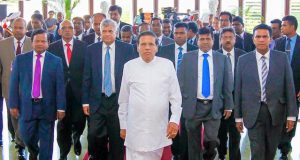‘Lies And Deception’ In The Cabinet Approved Counter-Terror Draft

April 30, 2017
The Sri Lankan Government has managed to ‘trick’ sympathetic members of the European Parliament into signifying approval for a draft Counter-Terror Act last week which is far worse than the existing Prevention of Terrorism Act (PTA). The CTA was proposed to replace the PTA as a better alternative as promised by the Government.
 Today’s Sunday Times carries a link to the ‘leaked’ Cabinet approved draft now to be drafted as a Bill and a lead story by senior journalist Namini Wijedasa on the conflict between the draft CTA’s prohibition on the ‘gathering of confidential information’ if it adversely affects public security and the Right to Information Act of 2016. The RTI Act leaves out ‘public security’ as a ground on which to deny information.
Today’s Sunday Times carries a link to the ‘leaked’ Cabinet approved draft now to be drafted as a Bill and a lead story by senior journalist Namini Wijedasa on the conflict between the draft CTA’s prohibition on the ‘gathering of confidential information’ if it adversely affects public security and the Right to Information Act of 2016. The RTI Act leaves out ‘public security’ as a ground on which to deny information.
The Government’s attempt to ‘trick’ its critics comes from unclear offences in the initial draft being secretively brought back through different language. The old draft was leaked by the Sunday Times last year but after a storm of shocked protests, its contents were revised to take out the worse parts. But those revisions are now no longer there. For example, the old offence of ‘espionage’ has been taken out but the actual content of the offence relating to ‘confidential information’ has been brought back under a different heading, linked to ‘terrorist’ or terrorist related offences.
Prominent legal commentator Kishali Pinto-Jayawardena points out that this exercise amounts to ‘lies and deception.’ Writing her regular column to the Sunday Times, she says that protections offered through the draft CTA for legitimate criticism in regard to the issue of ‘confidential information’ are totally inadequate.
Protection is given for anything published in ‘good faith’ with ‘due diligence’ and ‘for the benefit of the public in the national interest in registered print and electronic media or in any academic publication. Also, the protection will not apply if the publication is not ‘registered’ or is carried online.
Under the Cabinet approved CTA, it will be a terrorist offence to write or talk in a way that causes harm to the ‘unity, territorial integrity or sovereignty of Sri Lanka,’ It was under a similar provision in the Prevention of Terrorism Act that journalists had been jailed through politicized prosecutions in the past. Now a publication may qualify as an offence if the writer is found to lack good faith or did not observe due diligence or the publication was not in the national interest by a judge. These are ‘safeguards that provide scant protection in a dysfunctional judicial and prosecutorial process’, Pinto-Jayawardena has said. ‘Provisions that are perfectly reasonable in functional Rule of Law systems assume sinister meaning connotations here because of that reality’ she adds.
